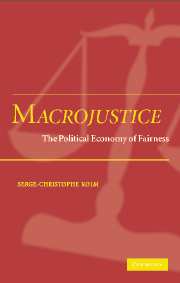Book contents
- Frontmatter
- Contents
- Presentation
- PART ONE BASES: CONSENSUS, FREEDOMS, AND CAPACITIES
- PART TWO OVERALL DISTRIBUTIVE JUSTICE: ELIE (EQUAL LABOUR INCOME EQUALIZATION)
- 7 Equal labour income equalization: General presentation
- 8 Models of labour and productivity
- 9 Equal duration income equalization
- 10 Information
- 11 Income justice
- 12 General equal labour income equalization: The model
- 13 Involuntary unemployment
- PART THREE COMPARISONS WITH POLICIES AND PHILOSOPHIES
- PART FOUR THE DEGREE OF COMMUNITY, EQUALITY, RECIPROCITY, AND SOLIDARITY
- PART FIVE COMPARISON WITH ECONOMICS' SOCIAL ETHICS
- References and bibliography
- Index
13 - Involuntary unemployment
Published online by Cambridge University Press: 31 July 2009
- Frontmatter
- Contents
- Presentation
- PART ONE BASES: CONSENSUS, FREEDOMS, AND CAPACITIES
- PART TWO OVERALL DISTRIBUTIVE JUSTICE: ELIE (EQUAL LABOUR INCOME EQUALIZATION)
- 7 Equal labour income equalization: General presentation
- 8 Models of labour and productivity
- 9 Equal duration income equalization
- 10 Information
- 11 Income justice
- 12 General equal labour income equalization: The model
- 13 Involuntary unemployment
- PART THREE COMPARISONS WITH POLICIES AND PHILOSOPHIES
- PART FOUR THE DEGREE OF COMMUNITY, EQUALITY, RECIPROCITY, AND SOLIDARITY
- PART FIVE COMPARISON WITH ECONOMICS' SOCIAL ETHICS
- References and bibliography
- Index
Summary
THE ESSENCE OF THE QUESTION
An individual may face a situation of the labour market where she cannot work more than a certain level. If this level is zero, she is fully involuntarily unemployed. If not, and if she accepts this level and would like to work more, she is in partial involuntary unemployment. This partial unemployment can affect any of the productive characteristics of labour: duration, level of qualification, intensity, etc. This can also be manifested as a limit on the sales of the product of labour (no buyer, or other quantitative or qualitative limits).
The ELIE distribution distributes the value of individuals' earning capacities due to their productive capacities. The noted constraints affect these earnings capacities: if the labour proposed by the worker exceeds the constraint, the earnings are limited to those obtained by the accepted and actually performed labour, defined by the constraint (these labour and earnings may be zero). Hence, earnings as a function of actual labour are not defined for labours beyond the limit, and earnings as a function of proposed labour present this threshold at the earning level of the highest possible labour. This constraint limits the individual's earning capacities, and it is imposed on the individual. Therefore, it should be incorporated in an ELIE distribution. However, the individuals' production functions used in ELIE theory give each individual's earnings as a function of her labour for all labours, and they are nondecreasing functions of the productive characteristics of labour.
- Type
- Chapter
- Information
- MacrojusticeThe Political Economy of Fairness, pp. 212 - 218Publisher: Cambridge University PressPrint publication year: 2004



